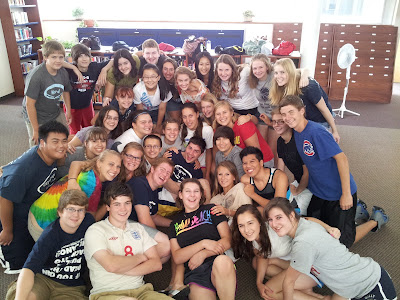During the week, I asked students to engage in a variety of problem-solving and group activities which encouraged them to be active, critical thinkers, and listeners. They needs to work together to develop strategies and rely on each others strengths. The more students collaborated, the more meaningful the activities became.
To start the camp, I give the entire group (36 high school students) three small boards. They need to determine how to Cross the Acid River in a timely manner using only three small boards. The objective is to get students to work together to get from one side of the river to the next. Several students were then given handy caps (a few could not see, a few could not talk, and one could not walk). Once students determined how to use the boards, they then stayed active by encouraging each side to work quickly and effectively. Students loved this challenge, and then debriefed afterward about what type of group member they were (active or passive) and how they contributed to the success of the team.
Blob Tag was another great game that asked students to think critically, collaborate, and create a strategic plan. Playing this game indoors (in the school library), with many obstacles created another layer of challenges. Students had fun both being part of the blob and avoiding it.
Toxic Waste was another challenging activity that required careful planning and physical skill. Students were asked to remove a small water bottle from the center of a ten foot circle using only rope and other supplies that were meant to distract students from the task. They needed to work carefully together, communicate with one another to remove the item and deliver it to a safe zone, about 30 feet away.
These three activities, paired with a variety of improv games, acting warm-ups, a scavenger hunt, and concentration activities were just some of the ways that we taught students that being an active group member, listening and sharing ideas, supporting one another, and saying "yes" can help improve their own individual success. Part of being a leader also means knowing when to take a step back and let others shine. This week really re-emphasized the importance of teaching students to be leaders in my mind. Team work and communication skills are essential to success. I am grateful for the opportunity to help students realize their potential, find success, and make meaningful and fun memories in the process.
There are many places that I got a lot of games and ideas from but here are some comprehensive resources that do a nice job covering leadership activities:
- http://www.leadershape.org/home.aspx
- http://www.leadership-with-you.com/
- http://improvencyclopedia.org/games/index.html
- http://www.amazon.com/Book-Team-Motivating-Games-Spirit-Building-Problem-Solving/dp/0071629629/ref=pd_rhf_ee_s_cp_3
- http://www.amazon.com/Book-Team-Building-Games-Trust-Building/dp/0070465134/ref=pd_sim_b_4







